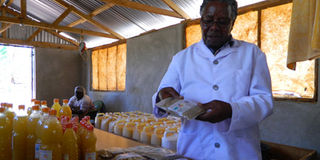Easy way to put money in mango farmers’ pockets

The chairperson of Karurumo Horticultural Self-Help Group, Mr Alloys Mbogo displays some of the products they produce in the establishment. After undergoing upgrading and revamping, the establishment will be launched this coming Tuesday. PHOTO | BRIAN OKINDA | NMG
What you need to know:
- Very high post-harvest losses (40–50 per cent) are reported in the mango value chain because of these challenges.
- The Rockefeller Foundation seeks to demonstrate the potential benefit of smallholder aggregation through their YieldWise initiative.
- In the just ending mango season, they were also able to sell their mango fruits to different buyers for between Sh6 and 10 a piece, up from the Sh3 to Sh5 offered by most buyers during the peak season.
- Processing can transform unsold fresh fruits into shelf-stable products to be sold at better prices later.
A survey carried out during the mango season last year revealed that while most traders buy mango fruits at a paltry Sh3 to Sh5 at the farm gate, the same fruits retail for as high as Sh60 in Nairobi.
Farmers are at the mercy of traders given the high perishability of mangoes. Once the fruit ripens, it has to be harvested before it falls off the tree and rot.
Without cold storage facilities, which could be used to slow down the deteriorative processes and possibly extend the marketing period of the fruits, the farmers are left with no choice but to sell their fruits at throw away price or leave the produce to rot on the trees.
Very high post-harvest losses (40–50 per cent) are reported in the mango value chain because of these challenges.
How can we change this narrative?
Farmers have often been encouraged to form groups as a strategy to enhance their bargaining power. Groups have also exploited group advantage to get training/extension services and buy agro-inputs more cheaply.
Post-harvest management and market access, however, remains a major challenge even for the farmers who belong to groups.
Aggregation of smallholder farmers into farmer groups is essential to meet the quantity, quality and consistency of produce required by buyers.
The Rockefeller Foundation seeks to demonstrate the potential benefit of smallholder aggregation through their YieldWise initiative.
Through a project implemented by researchers from the University of Nairobi and Jomo Kenyatta University of Agriculture and Technology, in partnership with the Rockefeller Foundation’s implementing partner Technoserve Kenya, two aggregation centres have been established.
The centres are envisioned to be one-stop shops that showcase post-harvest technologies and innovations that farmers can adopt to reduce post-harvest losses.
These include technologies for harvesting, storage, shelf-life extension, packaging, smallholder processing ,among others. Let’s look briefly at the two pilot centres.
Masii Smallholder Horticulture Aggregation Centre (off-grid)
The centre belongs to Masii Horticultural Farmers’ Cooperative Society in Machakos. The farmers do not require electricity to run it.
The centre is mainly for produce aggregation and is equipped with an Evaporative Charcoal Cooler (ECC) and a series of Zero Energy Brick Coolers (ZEBC).
They operate on the principle of evaporative cooling. When water evaporates from the wet charcoal and sand in the ECC and ZEBC, respectively, it takes away heat from the stored produce and the surrounding environment.
This not only results in a cooling effect but also increases relative humidity around the stored produce both of which slow down spoilage of the stored fruits or vegetables.
The cooling facilities in this centre have the capacity to hold three to four tonnes of mango fruits at a time. The group has already benefited from training on good production and postharvest handling technologies and practices from the project team.
In the just ending mango season, they were also able to sell their mango fruits to different buyers for between Sh6 and 10 a piece, up from the Sh3 to Sh5 offered by most buyers during the peak season.
The group hopes to graduate from simply aggregating produce to processing it and the Machakos County government has indicated that it will use the centre as model smallholder aggregation and processing centre.
Karurumo Smallholder Horticulture Aggregation and Processing Centre (on-grid)
This centre, which will be launched on Tuesday, belongs to the Karurumo Horticultural Self-Help Group in Embu County.
It is a full-scale aggregation and processing centre with facilities for both aggregation of fresh produce and small- scale wet and dry processing.
The installed facilities include the zero energy brick cooler and evaporative charcoal cooler similar to those in Masii. In addition, the centre has a coolbot cold room which is a low-cost alternative to a conventional cold room.
When the produce is received at the centre, it is sorted and graded based on the market destinations. Thereafter, the produce is pre-cooled in the evaporative coolers to remove the field heat prior to storage in the coolbot cold room.
Mango, which is the main fruit in this region, can be wet-processed into diverse products including pulp, mango concentrate and ready to drink juice.
Each of the two tunnel solar dryers installed at the centre has capacity to dry one tonne of high quality dried mango chips in one loading.
Processing can transform unsold fresh fruits into shelf-stable products to be sold at better prices later.
The two centres have been introduced on pilot scale with goal of replicating them in other regions in Kenya. This will require the support of the county governments and development partners.
The vision for this initiative is that smallholder aggregation centres will serve their intended purpose of delivering high quality and quantity fresh and processed horticultural products for the market.
This will ensure better returns for farmers while reducing postharvest losses in horticultural value chains. Small-scale processing will also spur growth of cottage industries thereby driving rural industrialisation, which will contribute to two of the government’s Big Four agenda – food security and industrialisation.
Dr Ambuko is the team leader, University of Nairobi Postharvest Project, supported by the Rockefeller Foundation’s YieldWise Initiative. Email: [email protected]




